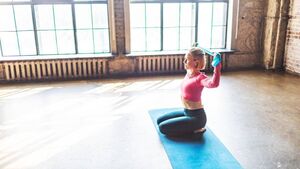Fit Focus: Bone health is crucial as we get older

Improving bone density is more than just making a simple change or adding in extra calcium
For a lot my clients and people in general making sure they are looking after their bone health is a really big concern and so it should be as it is a critical aspect of overall health.
It has an impact on everything from mobility to the risk of osteoporosis and fractures.
The older we get the more important it is to maintain strong bones, there are several effective strategies to improve done density and my aim for this piece to give you a thorough understanding of what you can do to help improve bone health.
However, first of all we need to understand what we mean by bone density, this refers to the amount of bone mineral in a given volume of bone. The higher your bone density indicates a stronger bone. Age, genetics, changes in your hormones such as during menopause and lifestyle choices can all significantly impact on bone health. While genetics do play an important role you can make a substantial difference by taking proactive steps.
The first thing we will look at is your nutrition and what you can do to help support stronger bones.
Calcium is a vital mineral for bone health. Adults typically need about 1,000 mg of calcium per day, increasing to 1,200 mg for women over 50 and men over 70. Excellent sources of calcium include dairy products, leafy greens and nuts and seeds.
Vitamin D is essential for calcium absorption. Without sufficient vitamin D, your body cannot effectively utilise calcium, leading to weaker bones. You can get vitamin D from sunlight (spending 10 to 30 minutes in the sun several times a week can help); food like fatty fish (salmon and mackerel), egg yolks, and fortified foods and if necessary, supplements.
Adequate protein intake is also crucial for bone health. Proteins are involved in the bone remodelling process, which is essential for maintaining bone density. Include a variety of protein sources in your diet, such as chicken, turkey, and fish meats and plant-based proteins like beans, lentils, tofu, and quinoa.
In addition to calcium and vitamin D, other nutrients play a role in bone health.
Magnesium, found in nuts, whole grains, and leafy green vegetable, is great along with vitamin K which is important for bone metabolism and found in leafy greens like spinach and kale.
Zinc is also essential for bone tissue growth, found in meat, shellfish, and legumes.
Secondly, we will look at how important exercise is for bone health. Physical activity is one of the most effective ways to improve bone density. Weight-bearing and resistance exercises are particularly beneficial:
These exercises force you to work against gravity, which stimulates bone formation. Examples include walking, jogging, running and dancing. A simple yet effective way to improve bone density.
Strength training helps build muscle and bone strength. Incorporate exercises such as:
weightlifting or bodyweight exercises like push-ups, squats, and lunges.
In addition to weight-bearing and resistance exercises, activities like yoga and tai chi can improve balance and flexibility, reducing the risk of falls and fractures.
Finally, we will look at every day changes you can make to your lifestyle to help 1. Avoid Smoking Smoking rates have been on a decline of recent, but it is still a real health problem we need to tackle. Smoking has been linked to decreased bone density and increased fracture risk.
Excessive alcohol consumption can interfere with calcium absorption and lead to bone loss. Moderation is key — limit intake to one drink per day for women and two for men.
Monitor your bone health through regular check-ups, if you don’t know what your numbers are then you are guessing, and you will have no idea if the interventions you are putting in place are having a positive impact or no impact at all.
Improving bone density is more than just making a simple change or adding in extra calcium it needs a multifaceted approach involving proper nutrition, getting regular exercise, and healthy lifestyle choices for it to be as successful as possible.
It is really important though to realise that it's never too late to start — taking proactive steps now can lead to stronger bones and a healthier future.





